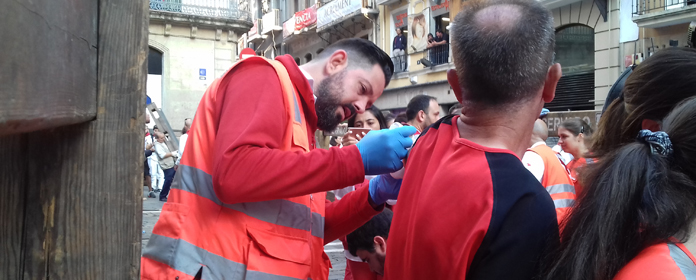Ruth Reinaldo, Red Cross volunteer nurse: "Working here you acquire a very important responsibility and an even greater satisfaction".
Ruth is a former student of School of Nursing at the University of Navarra and financial aid voluntarily participates in the running of the bulls during the San Fermin fiestas.

Every morning at 8:00 am everyone gets ready to watch the running of the bulls on its historical route. From the TV, from the radio or in situ. However, for many others the running of the bulls starts earlier. And it does not start on the slope of Santo Domingo but in Leire Street at 6:30 am. This is where the headquarters of the Red Cross of Navarra is located, where the health care teams, indispensable in any running of the bulls, are located.
Upon entering, they pick up their uniforms and gather in groups. At the head of each team is the coordinator who gives advice, instructions and guidelines for action during the meeting . Doctors, technicians and nurses go out with their equipment on their backs and stand in the front row of the fence waiting to hear the starting gun. The waiters at their posts wish each other luck so that nothing happens.
One of the volunteers there is Ruth Reinaldo (Navarre, 1985), a former student of School of Nursing at the University of Navarra. She still remembers the first day she took part in a running of the bulls, "you acquire a very important responsibility and at the same time an emotion and satisfaction of being part of something so different".
Ruth is a nurse at the Buztintxuri Health Center and has been a Red Cross volunteer since 2010. She says that the role of a nurse at the scene of a running of the bulls is to "assess the scene where the incident occurs and work as a team with the doctor and the rest of the colleagues" to properly manage the accident. "The nurse is in charge of cannulating a venous line when necessary, taking vital signs, administering medication by medical order, immobilization, and complex cures, among others," says Ruth.
Many of the volunteers come from far away, as is the case of Humberto Guimaraes, a Venezuelan nurse living in Galicia. At the top of the fence he is in charge of watching with a thousand eyes what may happen during the degree program. "I joined the Red Cross in Venezuela when I was still at high school. When I arrived in Spain I continued and I have been a Red Cross nurse for 22 years. work here at the national level and when necessary I come to Pamplona to help".
Marta Ortiz is not from Navarre, nor does she live in Pamplona. She is Catalan and comes from Barcelona because "20 years ago they offered it to me and I thought it was an opportunity to do my bit and gain experience. I never said no to anything and here I am...", she says. Together they make a team to get through the difficulties that the bull run presents.
When it comes to dealing with any subject incident - serious or minor - everyone works together. The work as a team should be a maxim in this work as they work under a lot of pressure. "For me it is very important to work as a team and with a good atmosphere. As they say, if one piece of the watch fails, the rest of the machinery fails, so it's the same here," says Humberto. Marta, for her part, recommends "chatting with each other beforehand, you gain confidence with the rest of your colleagues. This is reflected in a better attendance because we learn different ways of working, to be flexible and to know how to listen... you always contribute something, but above all you receive a lot".
The lockout ends and everyone returns to the headquarters. They pick up the material and, for many, their workshop work begins at their jobs at work.
